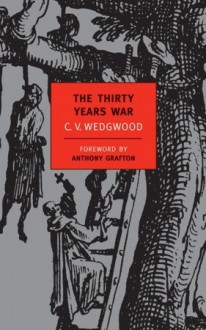
War is hell, just imagine it lasting for an entire generation with armies crisscrossing the same ground again and again producing famine, depopulation, and disease all in the name of religion, nationalism, and then finally simple greed. C.V. Wedgwood’s The Thirty Years War covers nearly a half century of history from the causes that led to the conflict through its deadly progression and finally it’s aftereffects.
From the outset Wedgwood sets the German domestic and the continental political situations in focus by stating that everyone was expecting war but between Spain and the Dutch while the German economy was on the decline due to the rise of new trading patterns over the course of the last century. It was only with the succession of the Bohemian throne and the ultra-Catholic policies of the Ferdinand II after his election that started the war everyone knew was coming, sooner and further east than expected. The war began as a purely religious conflict that saw the Catholic German princes led by Emperor Ferdinand crush the Protestant opposition because many of the Protestants decided not to help one another until it was too late due to political conservatism that Ferdinand used to his advantage. It wasn’t until Gustavus Adolphus and the Swedes entered the conflict a decade later that the conflict turn slowly from religious to international and an extension of the Bourbon-Habsburg in which the former used first allies then their own troops to prevent the encirclement of France by both branches of the Habsburgs. The negotiations for the end of the war took nearly five years and would change as events in the field would change strategies until finally allied members of the Bourbon and Habsburgs would cut deals with the other side to quickly break deadlocks and achieve peace but how it took almost six years to stand down the armies to prevent chaos.
Wedgwood’s narrative historical style keeps the book a very lively read and makes the war’s progress advancing even when she’s relating how the continuous fighting was affecting the German population. She is very upfront with the men, and a few women, who influenced the conflict throughout it’s course from the great kings of Ferdinand II, Christian IV of Denmark, and Gustavus to the great princes Maximillian I of Bavaria, John George of Saxony, and Frederick Henry of Orange to the mercenary generals that gained in importance as the conflict continued like Albrecht von Wallenstein to finally the political masterminds of Richelieu and Mazarin. With such a large historical cast, Wedgwood’s writing keeps things simple and straight for the read thus allowing the conflict’s long drawn out nature to fully impact the reader and how it affected those out of power. And in describing the aftereffects, Wedgwood disarms many myths about the effects of the war that over three hundred years became considered fact.
The Thirty Years War by C.V. Wedgwood is an excellent narrative history of a conflict that saw the end of one kind of conflict and the beginnings of another with interesting personalities that fought and conducted policy around it while also showing the effects on the whole population. If you’re interested in seventeenth-century history or military history, this book is for you.

 Log in with Facebook
Log in with Facebook 









